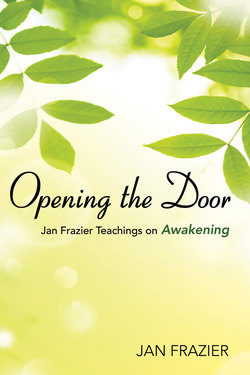Читать книгу Opening the Door: Jan Frazier Teachings On Awakening - Jan Inc. Frazier - Страница 12
На сайте Литреса книга снята с продажи.
Already Free
ОглавлениеIt is one thing to say I long to become free someday (free of torment, of the limited sense of self, of the illusion of separation). It’s another thing to say I long to discover that I am free. Already free. The difference between the two is significant. This is not a playing around with semantics. In the “someday” orientation to possible freedom, the eyes are on a later time. On getting something, achieving a condition not inherent. The mind is caught up in the necessity for change. (The task is daunting. So much seems to need changing.) In the other orientation, the “already here” one, the eyes are on right now. Something that is already the case, just not seen.
Someday keeps time alive. But reality isn’t experienced in time. Certainly not later. The truth of our essence is known in immediacy. When this is seen, when it is felt in the viscera, time is felt to have stopped. But really, it’s that time is understood to be an invention by the mind, a convenience for ordering events and making plans. Time didn’t stop exactly; it never started in the first place. Any moment in which there is a direct knowing of the real — including the real as it expresses itself in human awareness — time is not experienced. This is because the mind (where time lives) has grown quiet.
Why is this distinction so important? Of what use is it to deeply get that freedom is already here — to see how different that is from saying Maybe someday I will attain freedom?
When the great waking-up takes place, one thing that is realized is this: I was free all along. I just didn’t know it. What is realized, probably with something of a shock, is that all along, an essential choice was being made: whether or not to locate who I am in the events, roles, and history of what life holds. Understood another way, the choice being constantly made is whether to allow what happens to cause (or to relieve) suffering.
The question is Who am I? Am I my background, the roles I play in my personal and outer life? Am I my values, the way I imagine I am seen by others? Am I the sum total of my prior experience? Am I my physical features (age, gender, health condition)?
The revelation that comes at the radical awakening is that there is an awareness contained in this living body that has nothing to do with any of these things — with who I have always thought of myself as being; with the push-and-pull of outer events, of desire and fear, ambition and dissatisfaction. The discovery of utter calm and well-being within, at the heart of all the commotion — the realization that this content awareness has been there right along — is shocking, for sure. And yet: it is known to be the case. It is deeply familiar, this unconditioned “self.” It feels like home.
Something in us always did know. However consciously aware of that knowing we may or may not have been.
So go back to the other side of awakening. The before part. If a person, caught up in the compelling apparent reality of conditioned life, says to self I long to become free, what is being looked past is the possibility that I am already free; I just don’t know it.
If I sit with the idea that my task is to discover how I am already (constantly) exercising freedom, then a gently insistent pressure is brought to bear on the present, as each moment unfolds. In the stillness of the immediate — in the willingness to look deeply at how the familiar self keeps itself alive, keeps itself believing it is ultimately real — light can enter the seeing. The discovery can be made (it really can) that each moment is brimming with freedom.
